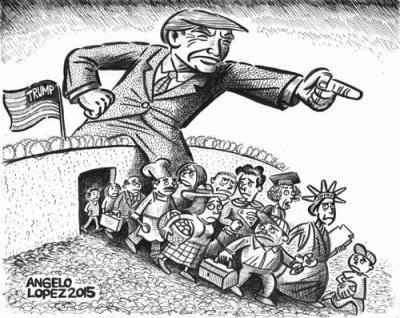Post by David Hernández, Assistant Professor of Latina/o Studies, Mount Holyoke College. David is the co-editor of Critical Ethnic Studies: A Reader (Duke University Press, 2016) and is completing a monograph of the institution of immigrant detention in the United States.

Trump did suggest pushing certain enforcement initiatives farther than they've gone in the past. He pledged that all undocumented border crossers would be mandatorily detained until they are deported. Inside the country, he would issue detainers for migrants "arrested for any crime whatsoever," but not necessarily convicted. Finally, he would rescind the Obama administration's deferred actions protecting certain classes of migrants from removal, adding to the list of immediately deportable people. In each of these cases, Trump pushes the envelope without considering the fiscal costs and economic consequences, nor any nuances or specifics about what constitutes a "criminal." These reforms would vastly and unfeasibly increase the detention regime. Perhaps he believes Mexico will pay for it.
Days after his speech, Trump flipped and flopped some more, intimating that once he is satisfied that the border is secure, then he would consider ways for the eleven million undocumented to stay in the country—a "softening" as he calls it. Like most of his talk about immigration, this claim seemed to have been made up on the spot and is full of contradictions. If he's going to "soften," then why rescind Obama's Deferred Action for Childhood Arrivals (DACA), which does nothing to secure the border but only provides relief from deportation for so-called "good" migrants?
Despite some key similarities to what already exists under the Obama administration and what has been the status quo for decades, what are crucially different and partially innovative are Trump's harsh rhetoric (although it trades in racial anxieties over 200 years in the making) and his attempts to frame the realities of immigration in opposition to, well, reality. This includes the myth of immigrant crime and the idiocy of a wall to halt an undocumented population wherein almost half become undocumented after entering lawfully. Trump's anti-immigrant rhetoric is a foundational tool and active weapon in his campaign—much like his racist dog-whistle—inspiring voters and vigilantes to act on their own and at the very least to perpetuate age-old lies.
Donald Trump's immigration reform is a raging version of the status quo. His vacillations between toughness and softness—designed to reap the political payoff of the moment—are not unique. They are, however, central to his business model and deal-making strategy in which he places himself and his corporate interests before the public good. Trump is not unlike other politicians, including President Obama, who've walked the political tightrope of immigration. It was Obama—once called the "deporter-in-chief"—who ramped up the most devastating deportation machine in U.S history, while at the same time executing deferred action on deportation for undocumented youth who migrated as children and attempting to do so for undocumented parents of U.S. citizens.
At this stage it seems clear that softening on immigration will be limited to Trump's sporadic pandering. Instead, the centripetal force of his racist populism and his inability to retract or apologize will always lead him into murkier, more racist, and unconstitutional waters. As November 8 lurches into view, those of us hoping for a new page to be turned on US immigration policies, have many reasons to be worried.
Any comments about this post? Get in touch with us! Send us an email, or post a comment here or on Facebook. You can also tweet us.
Share:








